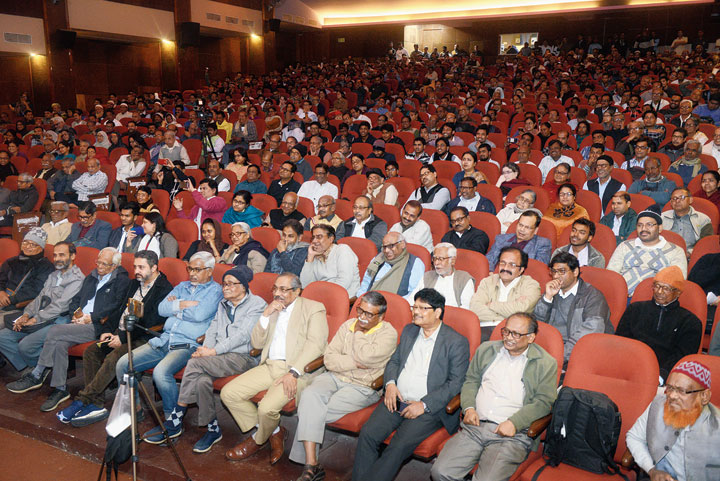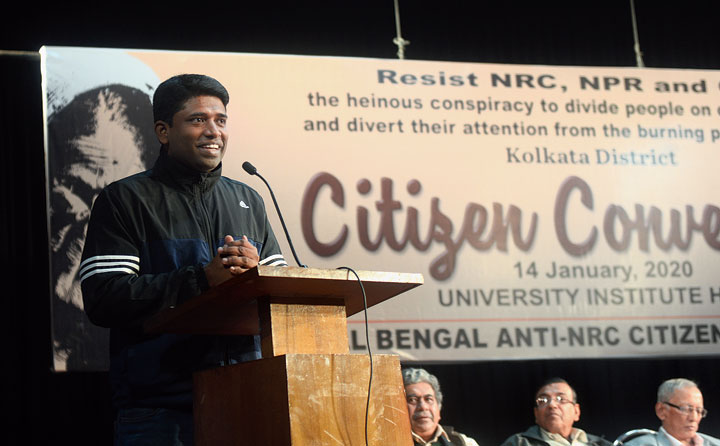Kashmiris then, Muslims now, tribals and Dalits next.
The politics of the Narendra Modi-Amit Shah dispensation thrives on creating an “other”, said a former IAS officer who quit the civil service to protest the clampdown in Kashmir.
“When (key provisions of) Article 370 were abrogated, Kashmir was the ‘other’. With the new citizenship thrust, Muslims are the ‘other’. If, theoretically, only Hindus remain, tribals and Dalits will be the new ‘other’,” Kannan Gopinathan told a citizens’ convention on the Citizenship (Amendment) Act-National Register of Citizens-National Population Register.
The convention was organised by the All Bengal Anti-NRC Citizens’ Committee.
Rights activist Sujato Bhadra, former state advocate general Bimal Chatterjee and Shahnaz Nabi, writer and former head of the Urdu department of Calcutta University, were among the other speakers at the convention.
Dhrubajyoti Mukhopadhyay, a former head of the department of geology at CU, presided over the event.
Gopinathan, a 2012-batch IAS officer from the Kerala cadre, has been a vocal critic of the Modi-Shah government since resigning from the civil service in August.
On Tuesday, he called the documents-based citizenship drive anti-poor because “rich people are likely to have papers and poor people are not”.
The proposed National Register of Citizens, Gopinathan said, will convert many citizens into refugees but a section of them will get their citizenship back through the CAA after a while, while others won’t.
“The government is busy selling the exercise as anti-Muslim because they want to create that ‘other’ through the amended citizenship act. The exercise is against the poor, no matter their religion. Every poor person will be harassed but some will be more harassed than the rest. Their plight will be projected by the government to make the less-harassed feel relieved,” he told the packed auditorium at University Institute Hall, off College Square.
The auditorium can seat 1,800 people. All the seats were occupied and several young men and women stood behind or sat in the aisles to listen to Gopinathan.

The packed auditorium during his speech
He compared the situation in the country to a power outage where people’s first reaction is to look at the neighbours’ houses and be content if the entire area is dark. If power is restored after a while, people are happy and forget the blackout should not have happened in the first place.
“The government has understood that it does not need to give the people anything. Just take away what they have. Tell them you have done the same with their neighbours. Tell them while they might get it back, their neighbours might not. People are content,” Gopinathan said, as the audience broke into a loud applause.
Ali Arfat, in his early 30s, was among those who were cheering loudly. Ali’s family runs a shop selling tarpaulin sheets on Armenian Street. When the Supreme Court delivered the Ayodhya verdict (on November 9), Ali’s family was in a town in Rajasthan visiting relatives.
“The atmosphere was so charged up that we had to cancel return train tickets. People were scared,” the Zakaria Street resident told Metro outside the auditorium after the convention.
Ali is a member of the All Bengal Anti-NRC Citizens’ Committee.
Seema Sarkar, in the audience, runs a free tutorial for poor children in Beleghata. “From what I hear from the parents of the children, he (Gopinathan) was absolutely right. Poor people, both Hindus and Muslims, are most scared about the new citizenship drive,” she said.
Gopinathan also called out the Modi-Shah government for labelling dissent — “tukde-tukde gang” for university students, “urban Naxal” for those who question the government and “jihadi terrorists” for Muslims who raise their voice. Christian critics of the government are called “Vatican stooge and rice-bag converts”.
“The government and its supporters are baffled by Hindu protesters because they sincerely believe that a true Hindu cannot protest what they are doing,” said the former IAS officer.
Gopinathan had resigned while serving in Dadra and Nagar Haveli as power and non-conventional energy secretary. “I need my voice back to express and react to situations that I perceive to be unbefitting of a democratic country. Basically, I feel strongly about the suspension of the fundamental rights and the lack of response to it,” he had told this newspaper after putting down his papers.











